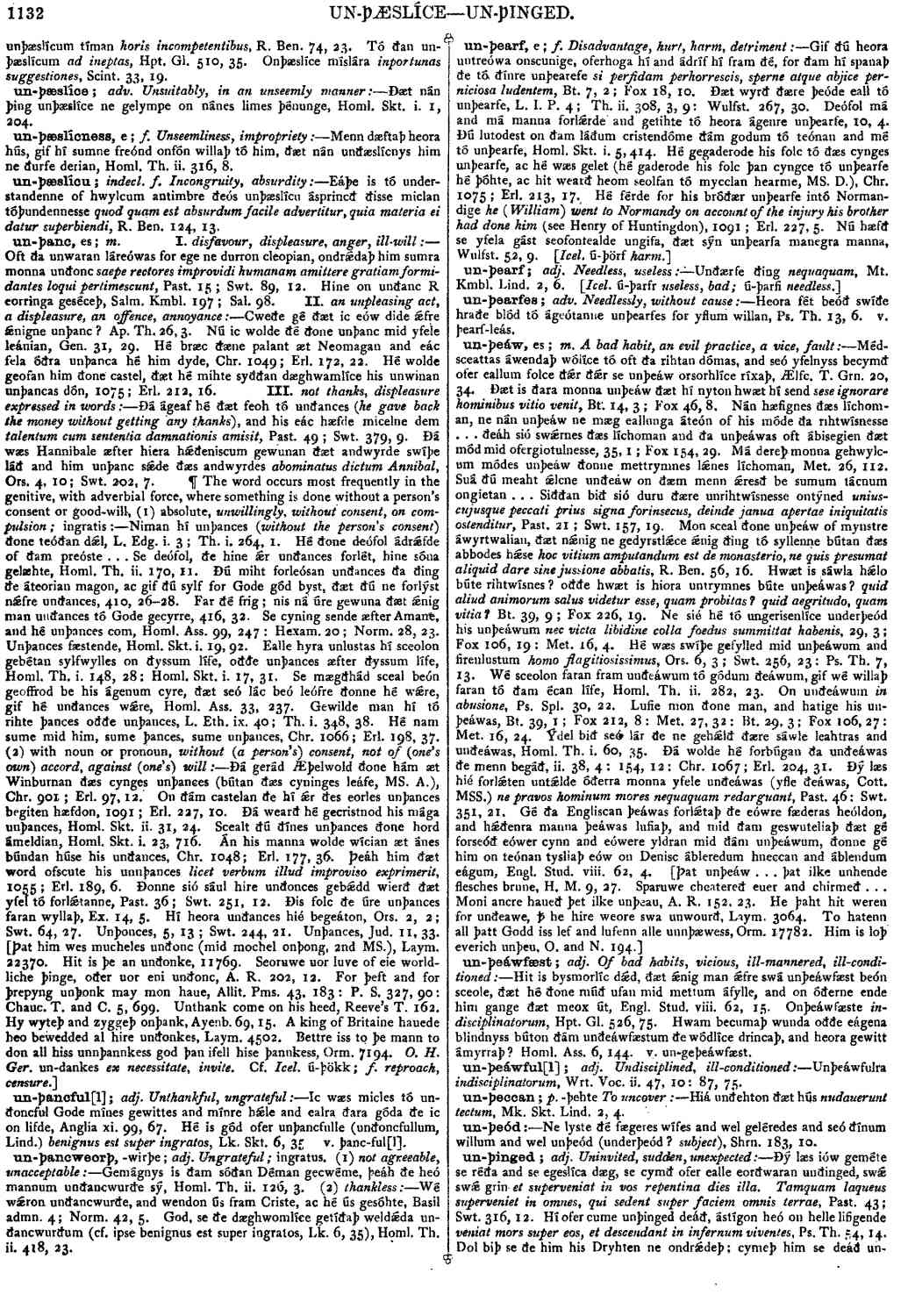un-þanc
- noun [ masculine ]
-
Oft ða unwaran láreówas for ege ne durron cleopian, ondrǽdaþ him sumra monna unðonc
saepe rectores improvidi humanam amittere gratiam formidantes loqui pertimescunt,
- Past. 15 ;
- Swt. 89, 12.
-
Hine on unðanc R eorringa geséceþ,
- Salm. Kmbl. 197 ;
- Sal. 98.
-
Cweðe gé ðæt ic eów dide ǽfre ǽnigne unþanc?
- Ap. Th. 26, 3.
-
Nú ic wolde ðé ðone unþanc mid yfele leánian,
- Gen. 31, 29.
-
Hé bræc ðæne palant æt Neomagan and eác fela óðra unþanca hé him dyde,
- Chr. 1049 ;
- Erl. 172, 22.
-
Hé wolde geofan him ðone castel, ðæt hé mihte syððan dæghwamlíce his unwinan unþancas dón,
- 1075 ;
- Erl. 212, 16.
-
Ðá ágeaf hé ðæt feoh tó unðances (he gave back the money without getting any thanks), and his eác hæfde micelne dem
talentum cum sententia damnationis amisit,
- Past. 49 ;
- Swt. 379, 9.
-
Ðá wæs Hannibale æfter hiera hǽðeniscum gewunan ðæt andwyrde swíþe láð and him unþanc sǽde ðæs andwyrdes
abominatus dictum Annibal,
- Ors. 4, 10 ;
- Swt. 202, 7.
-
Niman hí unþances ( without the person's consent ) ðone teóðan dǽl,
- L. Edg. i. 3 ;
- Th. i. 264, 1.
-
Hé ðone deófol ádrǽfde of ðam preóste ... Se deófol, ðe hine ǽr unðances forlét, hine sóna gelæhte,
- Homl. Th. ii. 170, 11.
-
Ðú miht forleósan unðances ða ðing ðe áteorian magon, ac gif ðú sylf for Gode gód byst, ðæt ðú ne forlýst nǽfre unðances,
- 410, 26-28.
-
Far ðé frig; nis ná úre gewuna ðæt ǽnig man unðances tó Gode gecyrre,
- 416, 32.
-
Se cyning sende æfter Amane, and hé unþances com,
- Homl. Ass. 99, 247: Hexam. 20 ;
- Norm. 28, 23.
-
Unþances fæstende,
- Homl. Skt. i. 19, 92.
-
Ealle hyra unlustas hí sceolon gebétan sylfwylles on ðyssum lífe, oððe unþances æfter ðyssum lífe,
- Homl. Th. i. 148, 28: Homl. Skt. i. 17, 31.
-
Se mægðhád sceal beón geoffrod be his ágenum cyre, ðæt seó lác beó leófre ðonne hé wǽre, gif hé unðances wǽre,
- Homl. Ass. 33, 237.
-
Gewilde man hí tó rihte þances oððe unþances,
- L. Eth. ix. 40 ;
- Th. i. 348, 38.
-
Hé nam sume mid him, sume þances, sume unþances,
- Chr. 1066 ;
- Erl. 198, 37.
-
-- Ðá gerád Æþelwold ðone hám æt Winburnan ðæs cynges unþances (bútan ðæs cyninges leáfe, MS. A.),
- Chr. 901 ;
- Erl. 97, 12.
-
On ðám castelan ðe hí ǽr ðes eorles unþances begiten hæfdon,
- 1091 ;
- Erl. 227, 10.
-
Ðá wearð hé gecristnod his mága unþances,
- Homl. Skt. ii. 31, 24.
-
Scealt ðú ðínes unþances ðone hord ámeldian,
- Homl. Skt. i. 23, 716.
-
Án his manna wolde wícian æt ánes búndan húse his unðances,
- Chr. 1048 ;
- Erl. 177, 36.
-
Þeáh him ðæt word ofscute his unnþances
licet verbum illud improviso exprimerit,
- 1055 ;
- Erl. 189, 6.
-
Ðonne sió sául hire unðonces gebǽdd wierð ðæt yfe tó forlǽtanne,
- Past. 36 ;
- Swt. 251, 12.
-
Ðis folc ðe úre unþances faran wyllaþ,
- Ex. 14, 5.
-
Hí heora unðances hié begeáton,
- Ors. 2, 2 ;
- Swt. 64, 27.
-
Unþances,
- 5, 13 ;
- Swt. 244, 25,
-
Unþances,
- Jud. 11, 33.
- Laym. 22370.
- 11769
- A. R. 202, 12.
- Allit. Pms. 43, 183: P. S. 327, 90: Chauc. T. and C. 5, 699.
- Reeve's T. 162.
- Ayenb. 69, 15.
- Laym. 4502.
- Orm. 7194.
Bosworth, Joseph. “un-þanc.” In An Anglo-Saxon Dictionary Online, edited by Thomas Northcote Toller, Christ Sean, and Ondřej Tichy. Prague: Faculty of Arts, Charles University, 2014. https://bosworthtoller.com/33838.
Checked: 1